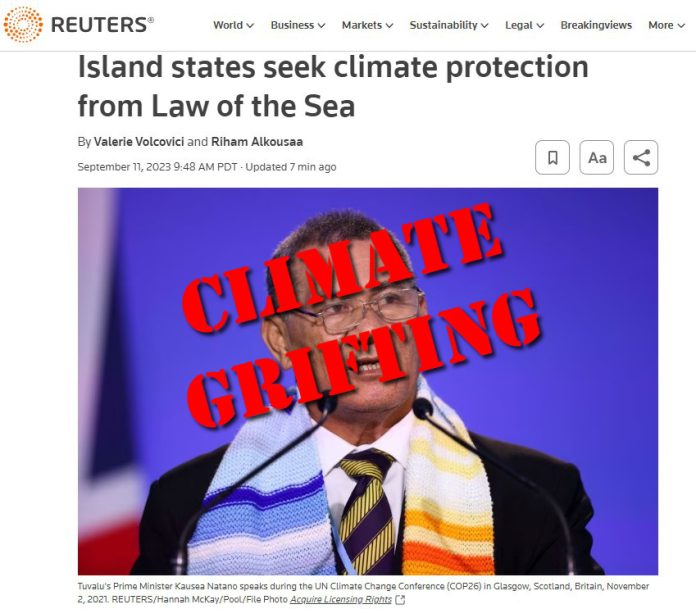The Guardian and Reuters, along with other mainstream media outlets and news services, are covering a “landmark” hearing in a case a group of small island nations are bringing to have carbon dioxide emissions from developed nations considered pollution under the Law of the Sea treaty, requiring countries to take action to prevent or mitigate emissions. Carbon Dioxide (CO2) is not pollution but rather is a naturally occurring gas necessary for life on earth and is not toxic at levels more than 10 times what they are today. Nor does data show carbon dioxide emissions are driving dangerous ocean or weather conditions which specifically threaten island nations justifying them having standing to bring a lawsuit.
The Guardian story, “Small island nations take high-emitting countries to court to protect the ocean,” and Reuters article, “Island states seek climate protection from Law of the Sea,” are just two of the news stories today covering a case brought by the Commission of Small Island States (COSIS), which includes as members, the Bahamas, Tuvalu, Vanuatu, Antigua, and Barbuda among other small island nations.
As The Guardian describes it:
In a landmark hearing, small island nations disproportionately affected by the climate crisis will take on high-emitting countries in a court in Hamburg, Germany, on 11 September, in what is being seen as the first climate justice case aimed at protecting the ocean.
During the two-day hearing, the nations – including the Bahamas, Tuvalu, Vanuatu, Antigua, and Barbuda among others – will ask the International Tribunal for the Law of the Sea (Itlos) to determine whether greenhouse gas emissions absorbed by the marine environment should be considered pollution.
…
Most countries have obligations under the legally binding UN convention on the law of the sea to take measures to prevent, reduce and control marine pollution.
If the case, brought by the Commission of Small Island States on Climate Change and International Law (COSIS), is successful, these obligations would include carbon-emission reduction and protection of marine environments already damaged by CO2 pollution.
Foremost among the claims made by COSIS is that rising CO2 is: causing sea levels to increase at a rapid rate threatening to swamp the islands; producing more extreme weather; and acidifying the seas. Each of these claims is false.
Concerning rising seas and island nations, Climate Realism has published multiple posts showing that island nations are not being swamped by rising seas, here, here, and here, for example. Indeed, data shows that they are expanding in size, development, and population.
Nor is purported CO2 induced climate change causing worsening tropical storms threatening islands survival, as demonstrated in Climate Realism reports here and here, for instance.
Also, contrary to COSIS assertions, the world’s seas are not becoming dangerously acidic due to rising CO2. This idea has been thoroughly refuted by the EPA’s own data and by other research as presented here, here, and here.
In short, COSIS’ Law of the Sea claims raised in the international court in Germany lack merit. COSIS can’t show that increased carbon dioxide is a pollutant because it is necessary to life and not toxic at any foreseeable levels. Nor can COSIS demonstrate that increased CO2 it is causing dangerous climate change in general, much less that it is producing any of the specific harms which they cite as evidence of climate damage, because none of the problems they claim are occurring are, in fact, taking place.

















